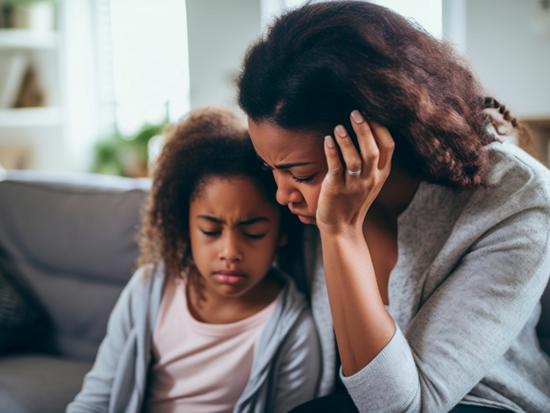 When discussing serious medical topics with children, a UAB psychologist says it is important to keep it simple: use language they understand and let them guide the discussion.Serious illness and death can be a difficult topic of conversation, especially when it impacts adolescents. The National Alliance for Children’s Grief predicts nearly 6 million children in the United States will experience the death of a sibling or parent by age 18. When facing bad news, how can parents best talk through it?
When discussing serious medical topics with children, a UAB psychologist says it is important to keep it simple: use language they understand and let them guide the discussion.Serious illness and death can be a difficult topic of conversation, especially when it impacts adolescents. The National Alliance for Children’s Grief predicts nearly 6 million children in the United States will experience the death of a sibling or parent by age 18. When facing bad news, how can parents best talk through it?
One University of Alabama at Birmingham psychologist explains how to break down serious topics for young children who might not fully comprehend what they mean.
Margaret Canter, Ph.D., assistant professor in the UAB Department of Pediatrics, suggests keeping conversations simple by using language they can understand and letting them guide the discussion.
“There is no need to get too technical — they do not need to know all the possible things that can go wrong,” Canter said. “We do not want to suggest they read about it on their own on the internet. Children ask questions for which they can handle the answers.”
Canter recommends following up with children for additional questions they may have. This will help solidify that there is an open door for communication. If a child asks a question to which the answer is not known, it is best to be open and honest.
 Margaret Canter, Ph.D.A simple response can be, “That’s a great question, but I do not know the answer. Let me look into it and get back to you.” Then make it a priority to investigate and inform the child when the answer is known.
Margaret Canter, Ph.D.A simple response can be, “That’s a great question, but I do not know the answer. Let me look into it and get back to you.” Then make it a priority to investigate and inform the child when the answer is known.
Children can be better than adults at letting others know what they need, but caregivers can also ask the child what they need or want during this difficult time.
“It is normal for children to struggle adjusting after losing someone they care about,” Canter said. “However, if the child’s mood is persistently low, their academic performance significantly declines or they begin to have problems in their relationships with others, it is a good time to reach out for therapeutic support for that child.”
Canter emphasizes that some caregivers may not be in a place to support a child because of difficulty managing their own grief and suggests reaching out for professional help during that time.
“I think it is important for family members to let children know they feel sad because of a death. However, it should be communicated that it is not the child’s job to be responsible for the caregivers,” Canter said. “It can be helpful to find a support group or counseling clinic that will guide you through this difficult time.”
The UAB Community Counseling Clinic offers affordable counseling services to the residents of Jefferson County and the greater Birmingham metro area. To schedule an appointment with a counselor, call 205-996-2414.